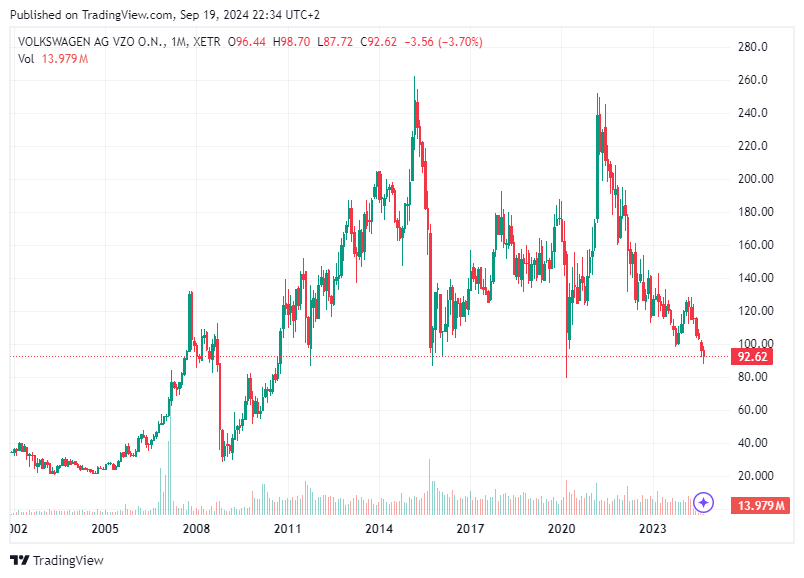Volkswagen Halts ID.4 Production: Door Malfunctions Recall
Volkswagen's Temporary ID.4 Production Halt: Examining the Recall and Its Broader Implications.

Disclaimer: The information provided in this article is based on publicly available sources and is intended for informational purposes only. No endorsement, commercial intent, or promotional content is included. Readers are advised to verify details independently before making any conclusions or decisions.
We are working endlessly to provide free insights on the stock market every day, and greatly appreciate those who are paid members supporting the development of the Stock Region mobile application. Stock Region offers daily stock and option signals, watchlists, earnings reports, technical and fundamental analysis reports, virtual meetings, learning opportunities, analyst upgrades and downgrades, catalyst reports, in-person events, and access to our private network of investors for paid members as an addition to being an early investor in Stock Region. We recommend all readers to urgently activate their membership before reaching full member capacity (500) to be eligible for the upcoming revenue distribution program. Memberships now available at https://stockregion.net
The automotive industry, particularly the segment of electric vehicles (EVs), is evolving rapidly, with manufacturers continually striving to innovate and overcome challenges. One such challenge recently confronted by Volkswagen (VW) involves its ID.4 electric vehicle. The company has decided to temporarily halt production of this model at its Chattanooga, Tennessee plant due to a recall prompted by door mechanism malfunctions.
Volkswagen's decision to pause production of the ID.4 was triggered by the discovery of a malfunction in the vehicle's door mechanisms. Reports indicated that water was seeping into the door handles, which shorted the electronics within, leading to unintended door openings. This malfunction poses both a safety risk and a technical challenge, necessitating immediate attention from the automaker.
In response to these malfunctions, Volkswagen initiated a recall of nearly 100,000 ID.4 vehicles. This recall affects models across the United States, with the company promising to replace the faulty door handles and update the software at no cost to the owners. The recall highlights the complexities inherent in modern automotive electronics, where even a seemingly minor issue can escalate into a safety concern. Approximately 200 workers have been furloughed as a result of this pause, a stark reminder of the tangible impact manufacturing issues can have on employees. Volkswagen has committed to supporting these workers during the furlough period, offering supplemented state unemployment benefits and ensuring they receive 80% of their base compensation.
This production stoppage is anticipated to last until early next year as Volkswagen works diligently to resolve the issue. The company has emphasized its focus on addressing the problem swiftly and ensuring its employees, dealers, and consumers are adequately supported through this disruption. Such measures are critical in maintaining morale and trust within the VW community and workforce.
Volkswagen's EV Strategy and Commitment
Despite this setback, Volkswagen has reiterated its commitment to the ID.4 and its broader EV strategy. The ID.4 remains one of the bestselling electric vehicles in the U.S., and the company continues to view it as a cornerstone of its growing battery electric vehicle (BEV) portfolio.
Volkswagen's dedication to its EV strategy is emblematic of the broader industry shift towards sustainable and electric mobility solutions. The recall and subsequent production halt, while challenging, do not alter the company's long-term vision. Instead, VW appears to be using this opportunity to reinforce its processes and ensure that its vehicles meet the highest safety and quality standards. The ID.4 recall and production halt have broader implications not just for Volkswagen but also for the EV market as a whole. As the industry transitions from traditional internal combustion engine vehicles to electric, manufacturers are encountering new sets of challenges related to technology integration and quality assurance.
It also highlights the need for manufacturers to establish robust customer service frameworks to manage recalls and maintain customer trust. From a market perspective, the recall may prompt other automakers to review their own processes to avoid similar issues. The competitive nature of the EV market means that any major production hiccup can have repercussions for a brand's reputation and consumer confidence.
Navigating Competitive Pressures and Future Outlook
Volkswagen's temporary production halt comes at a time when the company is navigating competitive pressures from other automakers in the EV space. The recall could potentially hinder sales momentum, as reflected in the recent decline in ID.4 sales. In the second quarter of the year, VW sold 5,690 ID.4 models in the U.S., marking a 15% year-over-year decrease. The first half of the year saw a 28% drop in ID.4 sales compared to the previous year.
Despite these challenges, Volkswagen remains optimistic about its future prospects. The company has been proactive in addressing the recall, working closely with dealers to implement a swift resolution. Additionally, VW is gearing up for contract negotiations with the United Auto Workers (UAW), indicating a focus on strengthening labor relations and potentially expanding its workforce in anticipation of future growth.
The temporary halt in ID.4 production is a significant event for Volkswagen, with both immediate and long-term implications. It serves as a reminder of the complexities involved in producing cutting-edge electric vehicles and the importance of maintaining stringent quality standards. While the recall presents challenges, it also offers Volkswagen an opportunity to refine its processes and reinforce its commitment to safety and customer satisfaction. As the company navigates this phase, it stands poised to continue its pursuit of innovation and leadership in the EV market.
Disclaimer: This article is intended for informational purposes only and does not constitute any commercial or promotional content. It is advised to independently verify the information presented and consult relevant experts for further insights.


